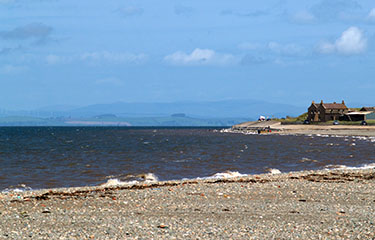On 5 July, the U.K. designated three highly protected marine areas in England, giving them the most protection available for ocean areas under the nation’s existing laws.
The Allonby Bay, North East of Farnes Deep, and Dolphin Head HPMAs are now off-limits for dredging and trawling, and as part of the announcement, the U.K. Department for Environment, Food, and Rural Affairs said it is exploring the designation of additional HPMAs in domestic waters.
“Highly protected marine areas are a crucial part of marine protection measures,” U.K. Marine Minister Lord Benyon said in a press release. “Today is a significant milestone for the U.K. as we ramp up action to recover our important marine ecosystems, and make sure species and habitats can thrive in healthy, diverse environments. This is a first step with more announcements to come.”
The declarations align with the U.K. government’s marine conservation targets under its Environmental Improvement Plan and 25-Year Environment Plan, as well as the country’s commitment under the Kunming-Montreal Global Biodiversity Framework to designate 30 percent of its national waters as protected.
Benyon said the designations are also meant to support the long-term health of the country’s fisheries.
“Evidence has indicated that stronger protections can lead to more and larger species in English seas and surrounding waters, contributing to the long-term productivity and sustainability of our fisheries sector,” Benyon said. “For example, the Lyme Bay reserve – one of the largest areas protected from dredging and trawling in the U.K. – demonstrated higher levels of biodiversity within the reserve area than outside, conserving species such as pink sea fans, lobsters, and scallops.”
Commercial fishing activity, including trawling and scallop dredging, has degraded some of the sites in recent years, according to Benyon.
“This new designation will create the potential for the full recovery of habitats and species,” he said. “Aside from attracting a range of seabirds and marine mammals, such as black-legged kittiwake and harbor porpoise, this site contains feeding and nursery grounds of important commercial fish species such as cod, herring, plaice, as well as ecologically important habitats such as ross worm reefs.”
U.K. environmental organizations applauded the move, but several asked for additional marine areas to be protected.
“Our seas were once abundant in wildlife but their fragile habitats are now suffering from decades of trawling, development and pollution,” The Wildlife Trusts Director of Policy and Public Affairs Joan Edwards said. “So the designation of these first highly protected marine areas off England’s shores is a significant first step towards ringfencing three small but precious places, where we’ll be able to learn what can really happen if nature is given an opportunity to recover. However, these three tiny spots cover just 0.4 percent of English seas – and we’re looking forward to seeing further designations so that we can safeguard our seas for the future.”
Benyon said the U.K. government is “committed to exploring additional suitable sites to be designated highly protected marine area status,” though he said any action to create more HPMAs is “subject to consultation.”
The move by the U.K. comes as the European Parliament is debating the future of the proposed Nature Restoration Law, which would smooth the way for the designation of additional HPMAs across 20 percent of E.U.-managed waters. An initial vote on June 27 on amendments to the law failed, but the full law in its original form faces a full parliamentary vote the week of 10 July.
The legislation has proved divisive, with some lawmakers concerned the protections for national habitats it establishes will come at the price of jobs and economic development. Opposition to the proposal has been led by the conservative European People's Party.
"We are already on the edge of doing too much. The Green Deal is a good thing, but we are about to overstretch it," EPP lawmaker Peter Liese told Reuters.
In advance of the vote, environmental non-governmental organization Bloom conducted a survey of 2,500 Europeans it said “reveals clear public support for the true protection of marine areas.”
The survey, which was conducted by Ipsos and surveyed 1,000 French citizens and 500 German, Spanish, and Italian citizens, found a ban on what it termed “destructive fishing methods” in protected areas has broad support.
The two-question survey found between 78 percent and 85 percent of each group sampled “are in favor of their government committing to protect 30 percent of their territorial waters more strictly, in accordance with the international standards of the International Union for the Conservation of Nature, by effectively banning towed fishing methods such as trawling on the seabed.”
The survey also found between 44 percent and 68 percent of each sampled group believed trawling was already banned in their country’s marine protected areas. Bloom said 86 percent of Europe’s MPAs remain open to trawling and flyshooting, or demersal seining.
“Following the disastrous vote of the European Parliament's Environment Committee, BLOOM takes action and calls on MEPs to adopt an ambitious Nature Restoration Law, and vote in favor of real protection for marine ecosystems and coastal and artisanal fishing,” Bloom said in a statement. “It is up to European representatives to take responsibility and respond to the scientific recommendations and their nation’s aspirations to adopt the crucial measures necessary to respond to the current collapse of the climate crisis and biodiversity collapse.”
Photo courtesy of Wikimedia Commons







